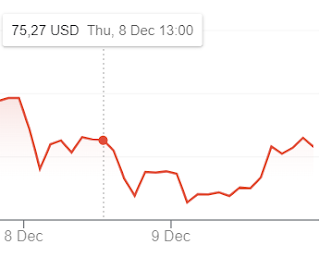I'm not one of those antitrust minimalists who would even like to abolish the FTC (in terms of reintegrating it into the DOJ Antitrust Division). That's why I'm even more disappointed in what's going on now, with the FTC wasting resources and losing credibility only because of some decision makers' desire to be seen as boldly anti-Big Tech. And it isn't even really anti-Big Tech because Microsoft's proposed acquisition of Activision Blizzard (NASDAQ:ATVI) has the potential to contribute enormously to a level playing field in mobile app distribution, ultimately benefiting the little guys.
The following chart shows how Activision Blizzard King's stock has moved in the aftermath of the FTC decision on Thursday afternoon:
ATVI was at approximately $75 when the FTC meeting finished. It temporarily went down after the decision leaked and was then formally announced. After trading hours on Thursday, the public redacted version of the complaint became available. If that one had contained a smoking gun or an impressive legal theory, ATVI would have tanked further. Not so: on Friday it basically returned to where it was before the decision (with only a minor after-hours adjustment). Wall Street largely expected that decision, but again: the complaint fails to convince analysts.
Yesterday I explained various shortcomings of the FTC complaint. Some people may believe that the FTC isn't going to district court yet to obtain a preliminary injunction (which it needs because the transaction could otherwise just be consummated regardless of pending litigation) because the merger is still being reviewed in other jurisdictions whose approval is required, and that may be a factor, but if and when the FTC tries, how can it possibly show a likelihood of success on the merits? Of course, the shorter the period between the PI motion and the expected resolution of its in-house adjudicative proceeding (with an evidentiary hearing (i.e., trial) scheduled for August 2) is, the better the chances that the district court will give less weight to the likelihood of success on the merits--but if the district court sees practically no merit in the case, how can a judge enjoin Microsoft and Activision Blizzard even for a short period of time?
Here's a recording from Jim Cramer's CNBC show where they talk about investor sentiment:
The key points are that the complaint is weak (as this blog said), that there is no economic data or analysis (this blog also noted that there is no theory of harm and the allegations are unsubstantiated), and that the FTC is going to lose. There also isn't too much concern over the EU process as Wall Street believes the European Commission will approve the deal with some remedies. The big question mark is the UK Competition & Market Authority (CMA), whose decisions--they say--are harder to appeal. Again, I wish to emphasize that this depends on the merits. It's yet easier to overturn a baseless CMA decision than a well-considered DG COMP or FTC ruling.
Not only is the FTC coming across as a regulatory agency that doesn't prioritize the legal merits of a case but there is even a risk of the FTC being exposed as a source of fake news. Having live-tweeted from a lengthy FTC trial in 2019, where the FTC staff did a really great job, I'm dismayed.
There are various articles out there now (example: wccftech, Microsoft Didn’t Lie to the EU on ZeniMax Deal Like the FTC Said, According to Sources) that report on a clarification the European Commission provided to the MLex subscription service, which apparently wanted to know whether it was true that Microsoft reneged on what it had promised the EC in connection with the acquisition of ZeniMax/Bethesda Softworks. In yesterday's analysis of the complaint, I explained that the FTC hasn't lied here--but it is fair to say that the FTC, which is hard pressed to find any argument for blocking a totally lawful and even procompetitive merger, has misled a lot of people into thinking that Microsoft walked back on a promise on which the clearance of a previous game studio acquisition depended.
Microsoft published a document (PDF) that explains what exactly happened around that acquisition: Microsoft kept its word.
The EC apparently pointed out that Microsoft's acquisition of ZeniMax/Bethesda was cleared unconditionally. If there were no commitments that the approval of the deal hinged on, Microsoft obviously couldn't renege on any in the first place. The clearance decision did not even rely on any informal commitments (public statements). The Commission simply found that the games industry would still be fragmented enough after the deal that other platforms would not have a shortage of input in terms of game titles.
In an earlier post I already showed the following table from a Microsoft filing with the UK CMA concerning its track record with ZeniMax/Bethesda titles on PlayStation (click on the image to enlarge):
All that the FTC can reasonably say is that a minority of Microsoft game titles in the future may still be Xbox exclusives--which Call of Duty won't be as a 10-year deal with Nintendo is in place, a similar commitment regarding Steam was made (and Steam operator Valve doesn't see a need to contractualize it as it knows it can rely on Microsoft), and Sony has a standing ten-year offer.
Instead of telling things in a way that no reasonable person would be likely to misunderstand, the FTC acted irresponsibly. For litigation purposes, it created a false impression that appeared to be an allegation or at least insinuation, and which threatened to hurt Microsoft's reputation. The FTC's mission is "protecting America's consumers" as opposed to "damaging America's companies"...and now the European Commission has to protect a major American company's reputation against the FTC. That's counterintuitive to put it diplomatically.

